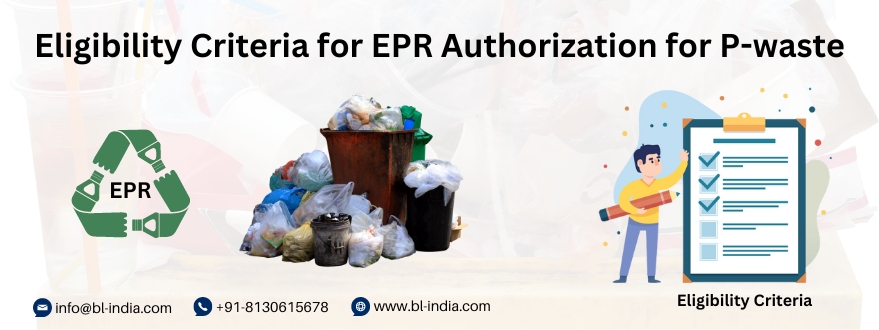
The proliferation of plastic waste has become a ubiquitous environmental challenge, prompting urgent action from governments, industries, and communities worldwide.
To resolve this issue, Extended Producer Responsibility (EPR) programs have emerged as a pivotal strategy to address the escalating crisis. EPR mandates that producers bear responsibility for managing the disposal and recycling of their products, encouraging sustainable practices, and reducing the environmental footprint of plastic waste.
In this blog, we will discuss who can apply to obtain the EPR Certification for plastic waste management. We will navigate through the regulatory process, explore the roles and responsibilities of PIBOs, and uncover the significance of EPR registration in fostering a circular economy and preserving our planet for future generations.
Extended Producer Responsibility (EPR) Authorization for plastic waste represents a paradigm shift in waste management strategies, placing the onus of responsibility squarely on the shoulders of producers and manufacturers. Under EPR, producers are mandated to take responsibility for the entire lifecycle of their products, from production to disposal.
For plastic waste, EPR Authorization requires producers to design products with end-of-life considerations in mind, ensuring they are recyclable, reusable, or easily biodegradable. This approach aims to minimize the environmental impact of plastic waste by promoting sustainable practices and encouraging the adoption of circular economy principles.
Producers are obligated to establish and finance collection, recycling, and disposal systems for their products, either individually or through collective schemes. EPR Authorization also entails compliance with regulatory requirements and reporting obligations, with penalties imposed for non-compliance.
By holding producers accountable for the environmental consequences of their products, EPR Authorization fosters innovation in waste reduction and recycling technologies, driving toward a more sustainable and resource-efficient future. It empowers consumers with transparent information about product sustainability, enabling informed choices and fostering a culture of environmental stewardship.
The Ministry of Environment, Forests, and Climate Change, Government of India, introduced an amendment to the Plastic Waste Management (PWM) Rules on February 16, 2022. According to these rules, producers, importers, brand owners (PIBOs), and Plastic Waste Processors are mandated to adhere to Extended Producer Responsibility guidelines outlined in Schedule II of the PWM Rules.
Under the EPR framework for plastic packaging, PIBOs are required to register through a centralized online portal developed by the Central Pollution Control Board (CPCB) and obtain EPR Registration for Plastic Waste Management from CPCB. PIBOs operating in one or two states/UTs must register with the respective State Pollution Control Boards (SPCB/PCC), while those operating in more than two states/UTs must register with CPCB.
PIBOs must ensure that plastic waste is processed through designated Plastic Waste Processors (PWPs) as per an action plan to fulfill assigned EPR targets. They must obtain a PWP certificate based on the quantity of plastic waste processed by PWPs, utilizing these certificates to meet their EPR obligations.
Note: Failure to comply with PWM rules may result in the imposition of environmental compensation and disciplinary action against non-compliant PIBOs.
Entities eligible to apply for EPR certification for P-waste in India involve various stakeholders within the waste management ecosystem. These include:
Eligibility criteria for each category are delineated as follows:
The primary responsibilities entrusted to PIBOs under the Extended Producer Responsibility are outlined as follows:
PIBOs are mandated to register themselves on the designated EPR portal to initiate their participation in the EPR program.
PIBOs are required to formulate and submit their action plan detailing strategies for meeting their EPR obligations effectively.
PIBOs are obligated to fulfill various EPR obligations, including:
PIBOs must submit annual returns, documenting their progress and compliance with EPR obligations over the course of each reporting period.
PIBOs are required to provide proof of certificates, such as Plastic Credits, as part of their compliance with EPR regulations.
PIBOs have the option to collaborate with Producer Responsibility Organizations (PROs) or other relevant agencies to meet their EPR targets. The ultimate responsibility for reporting and fulfilling these obligations rests solely with the PIBOs.
Extended Producer Responsibility covers the following categories of plastic packaging:
EPR registration for P-waste is an essential requirement in India due to several key factors:
Obtaining an EPR Registration Certificate for plastic waste involves several key steps:
Step 1: Gather all necessary documents and information required for the registration process.
Step 2: Visit the designated EPR registration portal provided by the relevant regulatory authority or government department.
Step 3: Complete the online application form with accurate details regarding your business, including contact information, manufacturing/importing activities, and types of plastic products involved.
Step 4: Upload all necessary documents as per the specified requirements.
Step 5: Process the payment of registration fees, if applicable, as per the regulations stipulated by the regulatory authority.
Step 6: Await verification and review of the submitted application by the regulatory authority.
Step 7: Ensure that your business operations and waste management practices align with the prescribed EPR guidelines and standards.
Step 8: Upon successful verification and compliance assessment, CPCB will issue the EPR registration certificate for plastic waste management.
In conclusion, the process of obtaining an EPR Certificate for Plastic Waste in India is a crucial step towards fulfilling regulatory obligations and demonstrating commitment to responsible waste management practices.
Brand Liaison, a dedicated compliance consultancy, assists Producers, Importers, Brand Owners, and Plastic Waste Processors in navigating the complexities of EPR certification to ensure that the journey towards sustainability is streamlined and efficient.
By leveraging our expertise and resources, PIBOs can obtain EPR certificates easily and quickly, ensuring compliance with Plastic Waste Management Rules and contributing to a cleaner, greener environment.
Our tailored approach, coupled with a centralized online platform and comprehensive support services, empowers PIBOs to meet their EPR obligations effectively while driving positive change in plastic waste management.